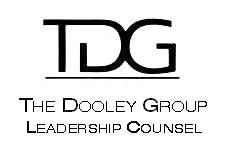A Few Minutes on the Couch With Dr. Dooley
By DENISE POWER
One might presume Richard Dooley’s unusual take on the CIO psyche might have something to do with his move last month from bustling Chicago to a scenic vista in New England. But those who know the former banking CIO, co-founder of the Society for Information Management, Chicago, and founder of The Dooley Group in Centerville Mass., would disagree that his tranquil new environs have much to do with it.
Degreed in philosophy and English, plus an MBA, Dooley has long been revered as a CIO leadership guru following a 17-year career at First National Bank of Chicago. A few minutes with Dooley reveal some unique perspectives about what’s missing in many CIOs today as they try to gain influence on strategy.
It seems like the idea of executive coaching is losing its stigma. Why is that? What are the problems CIOs are looking to overcome?
Lots of people are using executive coaches to get the soft and hard skills. The work is so engrossing today. You could work 168 hours a week and still not get finished. It’s not a question of working harder or smarter. You have to figure out how to get the spiritual side of man. I’m not talking about religion; I mean being reflective, meditative, being able to relax. Real reflection is not easy to do. People are lined up to see you, you are canceling meetings and there’s still not enough time.
What are you suggesting?
I do Tai Chi, but you could take a walk in the forest or just close your door and take deep breaths and clear your mind. Allow your subconscious to bubble things up. These could be things you missed in a meeting, things that haven’t been given any time to surface. Some think this is the luxury of those without enough to do.
But how does this help a CIO perform better, be responsive and make better decisions?
It gets you out of your own view. It gives you a broader view, a deeper view. If you don’t have what I call this new view, then you are liable to sink back into anger, impatience and your own understanding, rather than what is needed. It’s a tuning of the ears. You don’t get that tuning if you go through life with your head down like you are looking for something under the desk. You have to have that tuning to be effective.
People don’t know how to articulate what they want. A 5-year-old [who wants a cookie] doesn’t go to mother and say, ‘I would like some Grand Marnier and mix it with flour and mix it in with egg whites. It’s the same with executives. If you are not patient, and don’t have the sense to fill in the blanks, you don’t know what they are saying.
In agrarian society, normal life used to provide reflection. You’re plowing in a field and pause to look to the sky. The business vibration of today does not leave time for this.



